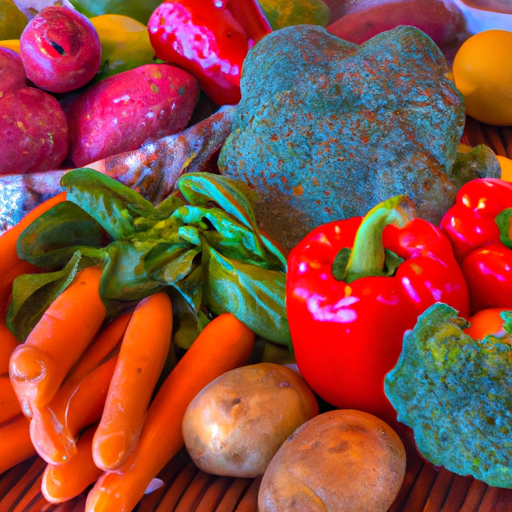Looking after your vision is essential, and nutrition plays a crucial role in maintaining healthy eyes. At 50 Dollar Eye Guy, our dedicated team of doctors is committed to ensuring your vision stays sharp. With our friendly and professional staff, we provide exceptional customer service to all our patients in Pensacola. From comprehensive eye exams to a wide range of fashionable eyewear, our goal is to provide the best possible vision care. Plus, we understand the importance of nutrition in eye health and are here to guide you with expert advice. So, come and meet our passionate team today and make an appointment to prioritize your eye health.
Eye Health and Nutrition
Taking care of your eyes is crucial for maintaining good vision and overall eye health. While regular eye exams and proper eye hygiene are important, nutrition also plays a significant role in keeping your eyes healthy. A well-balanced diet that includes specific nutrients can help prevent eye diseases and keep your vision sharp. In this article, we will explore the link between nutrition and eye health and discuss the essential nutrients you should incorporate into your diet.
The Importance of Nutrition for Eye Health
Proper nutrition is essential for maintaining the overall health of your eyes. The eyes, like any other part of your body, require specific nutrients to function optimally. Without these nutrients, your eyes may be more susceptible to various eye conditions and diseases. By incorporating the right foods into your diet, you can provide your eyes with the nutrients they need to stay healthy and maintain good vision.
Nutrients for Healthy Eyes
Vitamin A
Vitamin A is a crucial nutrient for maintaining good vision. It is responsible for the production of a pigment called rhodopsin, which helps your eyes adjust to changes in light. A deficiency in vitamin A can lead to night blindness, dry eyes, and an increased risk of developing certain eye diseases. To ensure an adequate intake of vitamin A, incorporate foods such as carrots, sweet potatoes, spinach, and broccoli into your diet.
Vitamin C
Vitamin C is a powerful antioxidant that helps protect the eyes from damage caused by free radicals. It also plays a significant role in the health of blood vessels in the eyes, reducing the risk of developing age-related macular degeneration (AMD) and cataracts. Citrus fruits, berries, kiwi, and bell peppers are rich sources of vitamin C that you can include in your daily meals.
Vitamin E
Like vitamin C, vitamin E is an antioxidant that helps prevent oxidative damage to the eyes. Studies have shown that vitamin E can reduce the progression of AMD and protect against cataracts. Nuts, seeds, spinach, and broccoli are excellent sources of vitamin E that you can incorporate into your diet.
Omega-3 Fatty Acids
Omega-3 fatty acids are essential for maintaining eye health. They help reduce inflammation in the eyes, which can contribute to conditions such as dry eyes and AMD. Fatty fish like salmon, tuna, and sardines are excellent sources of omega-3 fatty acids. If you are vegetarian or do not consume fish, you can opt for flaxseeds, chia seeds, and walnuts as alternative sources.
Lutein and Zeaxanthin
Lutein and zeaxanthin are powerful antioxidants that accumulate in the retina of the eye. They help filter harmful blue light and protect against oxidative damage. Studies have shown that a high intake of lutein and zeaxanthin can reduce the risk of developing AMD and cataracts. Foods rich in these antioxidants include leafy green vegetables, egg yolks, and corn.
Incorporating Eye-Healthy Foods into Your Diet
Now that you know the essential nutrients for maintaining good eye health, it’s time to incorporate them into your diet. Start by including a variety of fruits and vegetables in your meals. Aim for at least five servings of fruits and vegetables per day, focusing on those that are rich in the nutrients mentioned above.
You can also consider adding fish to your diet if you consume animal products. Fatty fish like salmon and tuna are not only excellent sources of omega-3 fatty acids but also provide other essential nutrients for eye health.
If you follow a vegetarian or vegan diet, make sure to include alternative sources of omega-3 fatty acids, such as flaxseeds, chia seeds, and walnuts.
In addition to these dietary changes, it’s crucial to maintain overall good health. This includes regular exercise, managing chronic conditions like diabetes, and avoiding smoking, as these factors can also impact your eye health.
Conclusion
Taking care of your eyes means more than just regular eye exams and proper eye hygiene. Nutrition plays a significant role in maintaining good eye health and preventing eye diseases. By incorporating the right nutrients, such as vitamin A, vitamin C, vitamin E, omega-3 fatty acids, and lutein and zeaxanthin, into your diet, you can support your eyes’ health and maintain clear vision. Remember to consult with your eye care professional or a registered dietitian for personalized advice and recommendations tailored to your specific needs. Start making healthy food choices today and ensure your vision stays sharp for years to come.

